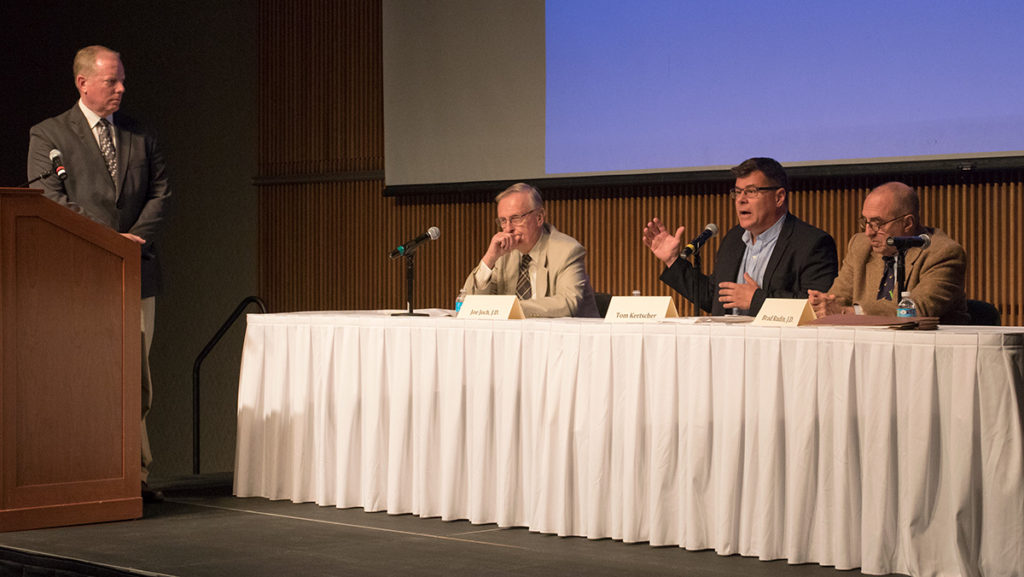The journalist responsible for covering the trial documented in the Netflix documentary series “Making a Murderer,” along with two local attorneys, spoke to over 75 students and faculty members about the rights that legal defendants have, or should have, to administer a fair trial.
In honor of Constitution Day on Sept. 17, which commemorates the signing of the U.S. Constitution in 1787, Ithaca College’s School of Business hosted “Rights of the Accused: Fact or Fiction? An In Depth Look at Constitutional Protections of Criminal Defendants” at 7 p.m. Sept. 15 in Emerson Suites.
The panel consisted of three speakers: Tom Kertscher, a journalist from the Milwaukee Journal Sentinel; Brad Rudin, a Tompkins County assistant district attorney; and Joe Joch, a lawyer and prosecutor who was elected the Tompkins County district attorney in 1974. Following speeches from each panelist on their area of expertise, they answered questions from the audience.
Many of the issues that were discussed were spawned by the Netflix series, which covers the trial and life sentence of a Wisconsin man named Steven Avery for an alleged murder in 2005. Kertscher also broke the story of Avery’s release from a previous prison sentence for a sexual assault charge from 1985 after new DNA testing revealed he had been wrongly accused, which is also covered in the series.
The documentary series was released in December 2015, eight years into Avery’s second sentencing, and raised serious questions of mishandling information within the jury system. It was revealed that during the first trial, the prosecution never informed Avery’s defense team of another suspect associated with the assault. Through DNA testing that was not widely used in 1985, it was revealed the other suspect was, in fact, guilty of the crime.
Kertscher said the legal proceedings of Avery’s cases raised several questions about how law enforcement agents view people of different socioeconomic classes.
“Here’s the guy from the other side of the tracks,” he said. “He’s had trouble with the law. He’s one of ‘those people.’ Conversely, the sexual assault victim was a woman who was very articulate. I think maybe because there was this imbalance that there was this rush to label Avery as a sexual assault perpetrator.”
Rudin said the prosecution in Avery’s first case violated the Brady Rule, which was established in a 1963 Supreme Court ruling and prohibits the prosecution from suppressing information that would cause the jury to rule in the defendant’s favor. Avery’s case, Rudin said, constituted a violation of this rule because the prosecution did not anticipate the knowledge of another suspect being a decisive piece of information.
Joch brought the audience’s attention to the “Criminal Justice Reform Bill” passed in response to the case of Brendan Dassey, Avery’s nephew, who was convicted with him in 2007. The bill requires all interrogations between authorities and suspects to be video recorded to prohibit the use of coercive interrogation tactics. Joch said that in this day and age, there is no excuse for law enforcement not to record all of its interactions with citizens.
Joch said detectives are often pressured by the public to convict a suspect after a tragedy. And the public, Joch said, is the same group of people from which the 12 jurors who will decide the fate of the suspect are chosen.
“It is human beings that make the system, and we have to start recognizing that human beings are very, very imperfect, and some of these very, very imperfect human beings are running the prosecution office,” Joch said.
After the panelists had spoken, they opened the floor for a question-and-answer session with the audience. Sophomore Tiffany Sanabia asked how Rudin and Joch refrain from contributing to injustice in the legal system.
“You fight like hell,” Joch said. “You make a record, and you have to do the best you can to make sure that the prosecution and the judge don’t get away with anything.”
Jim Johnson, instructor of marketing and law, said the City of Ithaca was an ideal place to have this conversation because of the educational resources of both Ithaca College and Cornell University.
“We can start to look at, you know, ‘What are possible solutions? Why do we elect prosecutors and judges?’” he said.
Angelina Noto said that as a freshman legal studies major, it was helpful to hear from such a diverse array of voices on the topic of how human flaws affect the outcome of trials.
“Something they really talked about was the part that human nature plays in the justice system and how that can affect trials drastically and, in turn, how that can affect people’s lives,” Noto said.
Veronica Santana-Frosen, lecturer in the Department of Legal Studies, said the discussion raises the question of how authorities are handling the investigation of Anthony Nazaire, the Ithaca College student who was murdered earlier this semester on the Cornell University campus.
“It brings up questions for me about what does his investigation look like? What are they doing to find his murderer?” Santana-Frosen said. “I haven’t heard anything yet about suspects, and yet we heard tonight that the DA’s office is driven by the people who elect them, the community.”








